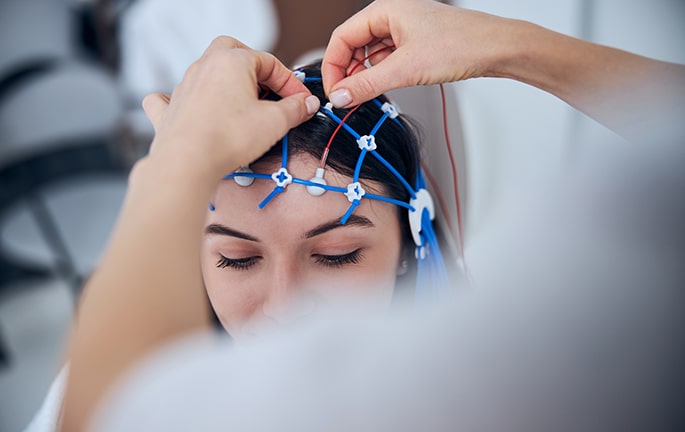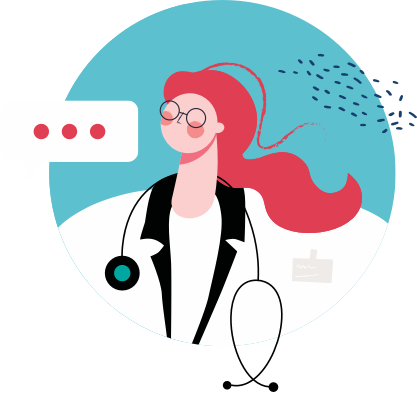Clinical neurophysiology
Find out what a neurophysiologist does and what clinical neurophysiology is. We tell you what diseases it studies, what diagnostic tests it carries out and what treatments it applies to patients. Book your appointment at one of our hospitals.

What is clinical neurophysiology?
Clinical neurophysiology deals with the diagnosis and treatment of diseases of the central, peripheral and neuromuscular nervous system, i.e. the brain, spinal cord, nerves, sense organs and muscle fibres. In addition, these specialists monitor patients during surgery to observe their condition during sedation and provide support in sleep disorder studies.
What does clinical physiology study?
This speciality studies the bioelectrical activity of the nervous system and builds on research in other areas of medicine, such as neurology and neurosurgery. The subspecialisation of Quirónsalud doctors in various fields enables them to analyse processes in greater detail and offer patients an accurate diagnosis and treatment adapted to their needs. Its main branches of research are:
- Radiculopathies: addresses disorders that result in a decrease or total loss of sensory or motor function of nerves, usually referred to as pinched nerves.
- Peripheral nerve: focuses on analysing diseases of nerves that carry information from the brain or spinal cord to the rest of the body, such as reflex sympathetic dystrophy, plexopathies or neuropathies.
- Sleep study: investigates the origin of sleep and rest disorders that cause apnoeas, parasomnias or restless legs syndrome.
Which patients is it for?
Clinical neurophysiology treats people of all ages suspected of suffering from nervous system diseases or disorders.
Techniques, procedures and diagnostic methods
Scientific and technological advances have led to significant improvement in diagnostic tests and therapeutic procedures in clinical neurophysiology. Thanks to increasingly more sophisticated devices, we can now detect diseases more reliably and establish the most suitable treatments. Some of the most commonly used procedures in this speciality include:
- Electroencephalogram or EEG recordings: a test that measures brain activity and is primarily used to diagnose epilepsy, although it also detects brain damage and dysfunction, sleep disorders or tumours.
- Single fibre electromyography (SFEMG): a technique to explore the motor plate, which is performed with a fine, highly precise needle that analyses an isolated muscle fibre. In these cases, jitter is used to indicate the latency variation of nerve impulse transmission.
- Intraoperative monitoring: continuously monitors spontaneous muscle activity during an operation to prevent injury to nerve structures.
- Polysomnography: a study in which functions such as breathing, heart rate or brain and muscle activity are analysed during sleep or while trying to sleep in order to detect possible disorders that may hinder proper rest.
Diseases and symptoms
Main pathologies and diseases
Some of the most commonly treated diseases in this speciality include:
- Amyotrophic lateral sclerosis (ALS)
- Attention Deficit Hyperactivity Disorder (ADHD)
- Parkinson’s
- Narcolepsy
- Epilepsy
- Myasthenia gravis
- Carpal tunnel syndrome
- Dementia
- Restless legs syndrome
- Myopathies
- Polyneuropathies
- Parasomnias
Related symptoms
The pathologies treated in clinical neurophysiology present the following symptoms:
- Nightmares
- Trembling
- Weakness
- Muscle cramps
- Memory loss
- Muscle fatigue
- Double vision
- Muscle stiffness
- Daytime drowsiness
- Lack of concentration
- Itching
- Low frustration tolerance
About the clinical neurophysiology consultation
We solve any doubts you may have before you see the specialist
Patients who come to a clinical neurophysiology consultation are referred by other specialists who suspect nervous system disorders. For this reason, it is common for the doctor to have prior information and test results. This helps them reach a diagnosis and establish the corresponding treatment.
What should you keep in mind?
During the consultation, the neurophysiologist takes a medical history and discusses with the patient their background and medical reports from other specialists. Following a physical examination, where appropriate, they will order the necessary complementary tests for a more accurate diagnosis.
What should I take to the appointment?
We recommend that you come to the appointment with a list of symptoms manifested and any previous pathologies, as well as the reports and results of tests that have already been carried out.
You may receive a questionnaire a few days before your appointment asking about your medical history, usual medication and other specific questions that will allow us to anticipate certain aspects of your consultation, helping us to expedite and personalise your care. To do this, we recommend that you download the free Quirónsalud Patient Portal application, which will facilitate communication with your healthcare team.

If you have any further questions, please contact us through the Patient Services telephone number: 900 301 013



























































